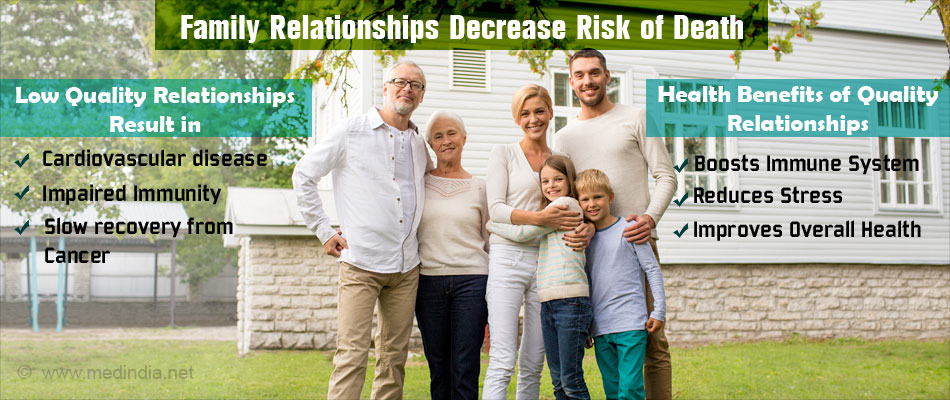
- Study finds that quality of relationship with family lowers risk of death.
- The more the number of people the individual feels close with, the lower the risk of death.
- Relationship with friends was not found to lower risk of death.
Low Quantity or Quality of Social Relationships
Poor or low quality social relationships can lead to- Cardiovascular disease development or progression
- Atherosclerosis
- Myocardial infarction/heart attack
- Delayed recovery from cancer
- Slower wound healing
- Inflammatory biomarkers
- Impairment of immune response
Relationships Benefit Health
Here are some facts pertaining to relationship and health of an individual.- Social ties associated with overall positive health
- The social ties like marriage, parenting, association with religious organizations have been found to exert an influence or control over the behavior and habits of an individual.
- They instill a sense of responsibility and encourage responsible behavior.
- They provide information about prospective treatment measures or ways to control the disease/infection.
- When there is emotional support during childhood it boosts
- Immune system
- Regulatory system
- Autonomic nervous system
- Hypothalamic pituitary adrenal axis
- When there is social support during adulthood it can lead to
- Reduced cardiovascular responses that occur during unexpected or existing stressors.
- The psychosocial support extended by marriage lowers cardiovascular disease risk.
“We found that older individuals who had more family in their network, as well as older people who were closer with their family were less likely to die. No such associations were observed for number of or closeness to friends,” says Dr James Iveniuk who is a researcher at Dalla Lana School of Public Health of University of Toronto.
Mortality Rates
The study utilized data from National Social Life, Health, and Aging Project (NSHAP) using nationally representative information obtained during the initial wave which was in 2005-2006 and a second wave which was in 2010-2011. The individuals who were between the age group 57 to 85 years old were assessed during the second wave and mortality rates determined.During the first wave of the survey, the participants in the age range were asked to list 5 people they were close to and what relationship they shared with them. They were also asked how close they felt with them.
Results of the Study:
- Each individual had 2.91 individuals with whom they shared a close bond.
- Apart from a spouse, the more number of relatives that the individual felt close with, the lower the risk of death.
- When the participants felt they were extremely close to the family members they had listed other than their spouse, there was a 6% risk of death within the next 5 years.
- When the participants felt they were not so close to the family members they had listed other than their spouse, there was a 14% risk of death within the next 5 years.
Characteristics of Social Support
- Marriage
- Feeling close to people who they consider their confidante
- More involvement in social organizations
- Knowing a large number of people
- Access to social support
- The amount of time spent with confidantes
- Loneliness
This study is an important source of support for people who are dependent on family members for physical and emotional during periods of illness. It stresses on the need to focus on relationships that we are born into or bonded into through marriage rather than on friendships for longevity.
References:
- Social Relationships and Health: A Flashpoint for Health Policy - (http://www.ncbi.nlm.nih.gov/pmc/articles/PMC3150158/)
- Relationships with Family Members, but Not Friends, Decrease Likelihood of Death - (http://newswise.com/articles/relationships-with-family-members-but-not-friends-decrease-likelihood-of-death)
Source-Medindia










